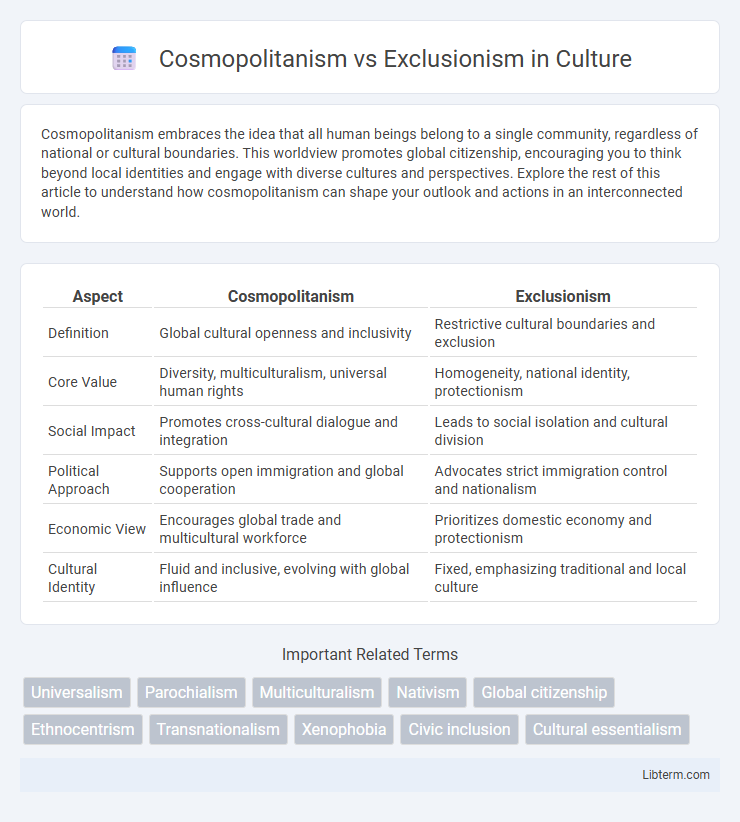Cosmopolitanism embraces the idea that all human beings belong to a single community, regardless of national or cultural boundaries. This worldview promotes global citizenship, encouraging you to think beyond local identities and engage with diverse cultures and perspectives. Explore the rest of this article to understand how cosmopolitanism can shape your outlook and actions in an interconnected world.
Table of Comparison
| Aspect | Cosmopolitanism | Exclusionism |
|---|---|---|
| Definition | Global cultural openness and inclusivity | Restrictive cultural boundaries and exclusion |
| Core Value | Diversity, multiculturalism, universal human rights | Homogeneity, national identity, protectionism |
| Social Impact | Promotes cross-cultural dialogue and integration | Leads to social isolation and cultural division |
| Political Approach | Supports open immigration and global cooperation | Advocates strict immigration control and nationalism |
| Economic View | Encourages global trade and multicultural workforce | Prioritizes domestic economy and protectionism |
| Cultural Identity | Fluid and inclusive, evolving with global influence | Fixed, emphasizing traditional and local culture |
Understanding Cosmopolitanism: A Global Perspective
Cosmopolitanism emphasizes a global identity that transcends national and cultural boundaries, promoting inclusivity and mutual respect among diverse populations. It advocates for universal human rights, global justice, and cooperation to address shared challenges like climate change and inequality. This global perspective fosters empathy, cultural exchange, and interconnectedness, contrasting exclusionism's focus on preserving distinct, often nationalistic, identities.
Defining Exclusionism: Barriers and Boundaries
Exclusionism defines social and political boundaries by limiting membership based on ethnicity, nationality, or cultural identity, creating barriers to inclusion. These boundaries often manifest through restrictive policies, social stigmatization, and institutional discrimination that reinforce in-group favoritism and out-group marginalization. The resulting exclusion restricts access to resources, rights, and opportunities, perpetuating inequalities and social division.
Historical Roots of Cosmopolitanism and Exclusionism
Cosmopolitanism finds its historical roots in Stoic philosophy and the Enlightenment, emphasizing universal human rights and global citizenship that transcend national boundaries. Exclusionism, conversely, emerged from tribalism, nationalism, and colonial-era ideologies that prioritize cultural, ethnic, or national identity to maintain social cohesion and political power. These contrasting worldviews have shaped modern debates on immigration, multiculturalism, and international law.
Key Philosophical Arguments: Unity vs. Division
Cosmopolitanism argues for universal moral principles that emphasize human unity, advocating for global justice and equal respect beyond national or cultural boundaries. Exclusionism prioritizes the interests and identity of particular groups or nations, asserting that social and political obligations are confined to distinct communities, which fosters division. Philosophically, the debate hinges on whether ethical duties should be extended universally or restricted to defined in-groups.
Sociocultural Impacts of Cosmopolitanism
Cosmopolitanism fosters diverse cultural exchanges that enhance social cohesion and promote global understanding by encouraging open-mindedness and acceptance of different identities. It supports multiculturalism, leading to enriched educational environments and increased creativity through the blending of traditions and perspectives. The sociocultural impacts include greater tolerance, reduction of ethnocentrism, and the creation of inclusive communities that challenge exclusionary practices.
Political Manifestations of Exclusionist Policies
Exclusionist policies manifest politically through strict immigration controls, nationalist rhetoric, and legislation that limits citizenship rights for minority groups. Governments employing exclusionism often prioritize policies that reinforce cultural homogeneity and national identity, marginalizing immigrants and ethnic minorities. These political measures can include border enforcement, discriminatory voting laws, and restrictions on social services access, directly contrasting with cosmopolitan principles of openness and global inclusion.
Comparative Analysis: Inclusivity and Exclusivity in Society
Cosmopolitanism embraces inclusivity by advocating for global citizenship and cultural diversity, promoting social cohesion beyond national or ethnic boundaries. In contrast, exclusionism prioritizes exclusivity, often emphasizing in-group loyalty and marginalizing outsiders, which can lead to social fragmentation and conflict. Comparative analysis reveals that cosmopolitan societies tend to foster tolerance and integration, while exclusionist frameworks may reinforce segregation and social inequality.
Benefits and Challenges of Cosmopolitan Approaches
Cosmopolitanism promotes global citizenship and inclusivity, fostering cross-cultural understanding and cooperation that enhance social cohesion and economic innovation. It supports human rights and equality by encouraging policies that transcend national borders, benefiting diverse populations. Challenges include managing cultural differences, balancing national interests with global responsibilities, and addressing potential resistance from exclusionist groups prioritizing sovereignty and identity preservation.
Social Consequences of Exclusionist Attitudes
Exclusionist attitudes often lead to heightened social polarization, reducing cohesion and trust within communities. These attitudes exacerbate inequalities by marginalizing minority groups, limiting their access to resources and opportunities. The resulting social fragmentation risks increased conflict and diminished collective well-being.
Towards a Balanced Future: Bridging Cosmopolitanism and Exclusionism
Bridging cosmopolitanism and exclusionism requires fostering inclusive policies that respect cultural diversity while addressing legitimate concerns about identity and security. Emphasizing shared human values and equitable resource distribution promotes global cooperation without erasing local identities. This balanced approach helps create sustainable, peaceful societies that integrate global interconnectedness with community resilience.
Cosmopolitanism Infographic

 libterm.com
libterm.com